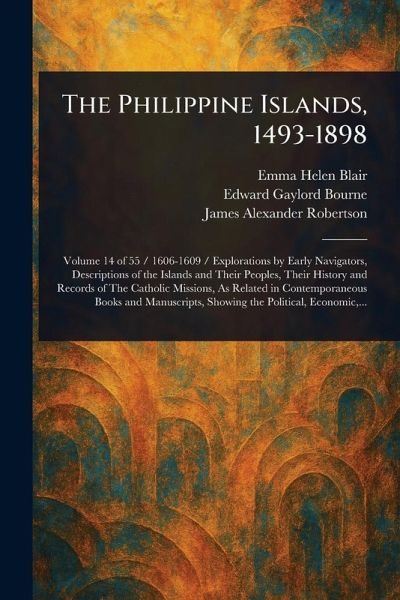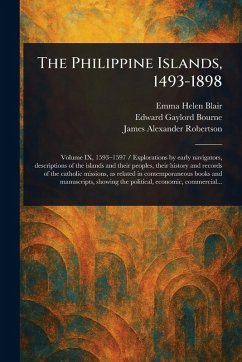
The Philippine Islands, 1493-1898
Versandkostenfrei!
Versandfertig in über 4 Wochen
20,99 €
inkl. MwSt.

PAYBACK Punkte
10 °P sammeln!
Explore the tumultuous early history of the Philippines with "The Philippine Islands, 1493-1898, Vol. 14, 1606-1609," a collection of historical documents offering a captivating glimpse into the Spanish colonial period. This volume delves into the critical years of 1606-1609, providing invaluable insights into the exploration, governance, and societal dynamics that shaped the islands. Compiled from various sources, this historical record sheds light on the complex interplay between Spain and the Philippines, documenting the impact of Spanish colonization and the enduring legacy of this era. Di...
Explore the tumultuous early history of the Philippines with "The Philippine Islands, 1493-1898, Vol. 14, 1606-1609," a collection of historical documents offering a captivating glimpse into the Spanish colonial period. This volume delves into the critical years of 1606-1609, providing invaluable insights into the exploration, governance, and societal dynamics that shaped the islands. Compiled from various sources, this historical record sheds light on the complex interplay between Spain and the Philippines, documenting the impact of Spanish colonization and the enduring legacy of this era. Discover details surrounding significant historical events, including the demarcation line of Alexander VI and its implications for the region. A vital resource for anyone interested in Philippine history, Southeast Asian history, or the broader context of global exploration and colonial expansion, this volume offers a detailed examination of a pivotal period. Journey back to the 17th century and uncover the rich tapestry of the Philippine Islands during the Spanish colonial era. This work has been selected by scholars as being culturally important, and is part of the knowledge base of civilization as we know it. This work is in the public domain in the United States of America, and possibly other nations. Within the United States, you may freely copy and distribute this work, as no entity (individual or corporate) has a copyright on the body of the work. Scholars believe, and we concur, that this work is important enough to be preserved, reproduced, and made generally available to the public. We appreciate your support of the preservation process, and thank you for being an important part of keeping this knowledge alive and relevant.














